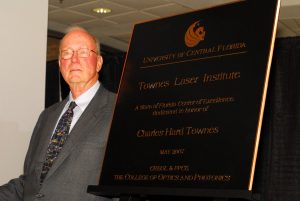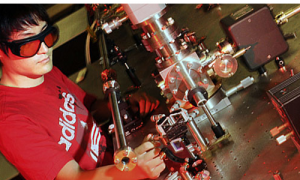The Florida Photonics Center of Excellence (FPCE) was established with a $10 million grant from the State of Florida to create a new center of excellence within The College of Optics and Photonics at the University of Central Florida. The program began in 2003 with three primary goals: advance excellence in research and graduate education to serve existing and emerging industry clusters in the state (photonics, optics, lasers), leverage state resources via partnerships with industry and government, and work in partnership with local, state, and regional economic development organizations to attract, retain, and grow knowledge-based, wealth-producing industries in Florida.
The focus of the FPCE’s research and education efforts has been on technologies such as nanophotonics, biophotonics, advanced imaging and 3D displays, and ultra-high bandwidth communications—fields expected to see rapid market growth. The grant has supported research infrastructure development (faculty, facilities, and equipment), competitive R&D projects in collaboration with Florida universities and industries, and commercialization efforts through partnerships with the FPCE Industrial Advisory Board, the UCF Technology Incubator, and the Florida Photonics Cluster.


The FPCE was established with a $10 million grant from the State of Florida to create a new center of excellence within The College of Optics and Photonics at the University of Central Florida. The program began in 2003 with three primary goals: Advance excellence in research and graduate education to serve existing and emerging industry clusters in the state (photonics, optics, lasers), leverage state resources via partnerships with industry and government, and work in partnership with local, state and regional economic development organizations to attract, retain and grow knowledge-based, wealth producing industries to Florida. The focus of the FPCE research and education work has been on the technologies of nanophotonics, biophotonics, advanced imaging and 3D displays, and ultra-high bandwidth communications, all of which are forecast to experience rapid market growth. The grant has been used for developing the research infrastructure (new faculty, new facilities, new equipment), funding competitive R&D Partnership Projects at Florida universities in partnership with Florida industry, and pursuing commercialization and outreach with the help of the FPCE Industrial Advisory Board, the UCF Technology Incubator, and the Florida Photonics Cluster.
The Townes Laser Institute was established in 2007 in the presence of and in honor of Charles Townes, inventor of the concept of the laser and a 1964 Nobel Laureate for Physics. Established for the development of next-generation lasers and their uses in medicine, advanced manufacturing, and defense applications, the Institute was funded by a $4.5 million grant from the State of Florida, together with matching funds from UCF for five faculty positions and $3 million for start-ups and infrastructure.
Since its founding, the Townes Laser Institute has grown to a faculty of 14 and has developed major capabilities in optical fibers, attoscience, and new laser materials. It has made significant investments in optical fiber pulling facilities, pre-form fabrication, and glass science and processing. It is currently building a comprehensive capability in transparent ceramic laser materials. Future areas of investment include mid-infrared sources and materials, medical laser technology, laser-bioengineering, advanced laser-based manufacturing, and new defense-related laser technologies, including long-distance laser light propagation through the atmosphere. The Townes Laser Institute is directed by Peter Delfyett.

The Institute for the Frontier of Attosecond Science and Technology (iFAST), directed by Prof. Zenghu Chang, was established in 2013. Currently, iFAST hosts six research groups dedicated to advancing research, education, and outreach in attosecond physics and optics.
The institute’s mission is to foster collaboration among faculty, scientists, and students from the College of Sciences and CREOL in the field of attosecond science. It aims to create and share new knowledge through high-impact fundamental and applied research, as well as to develop next-generation attosecond lasers that support technology transfer and job creation in Florida and across the nation.
iFAST has been awarded $8 million by DARPA’s PULSE program and $7.5 million through a MURI grant to support its work in developing high-energy, ultrashort attosecond light sources.


The Institute for the Frontier of Attosecond Science and Technology (iFAST), directed by Prof. Zenghu Chang, is established in 2013. At the present time, iFAST has 6 research groups dedicated to research, education and outreach of attosecond physics and optics. The mission is to provide unique opportunities for faculty, scientists and students from the College of Sciences and CREOL to closely collaborate in attosecond science research, create and disseminate new knowledge in attosecond physics by conducting, presenting, and publishing cutting-edge fundamental and applied research and develop next generation attosecond lasers for technology transfer and creating jobs in the State of Florida and the nation. An $8 million DARPA PULSE and a $7.5 million MURI have been awarded to Chang and his collaborators to develop high energy and ultrashort attosecond light sources.
Affiliated Research Centers
Advanced Materials Processing And Analysis Center (AMPAC)
NanoScience Technology Center (NSTC)
Burnett School of Biomedical Sciences
Florida Solar Energy Center (FSEC)
Florida Space Institute (FSI)
Institute for Simulation and Training (IST)
BRIDG
CENTER FOR DIRECTED ENERGY
